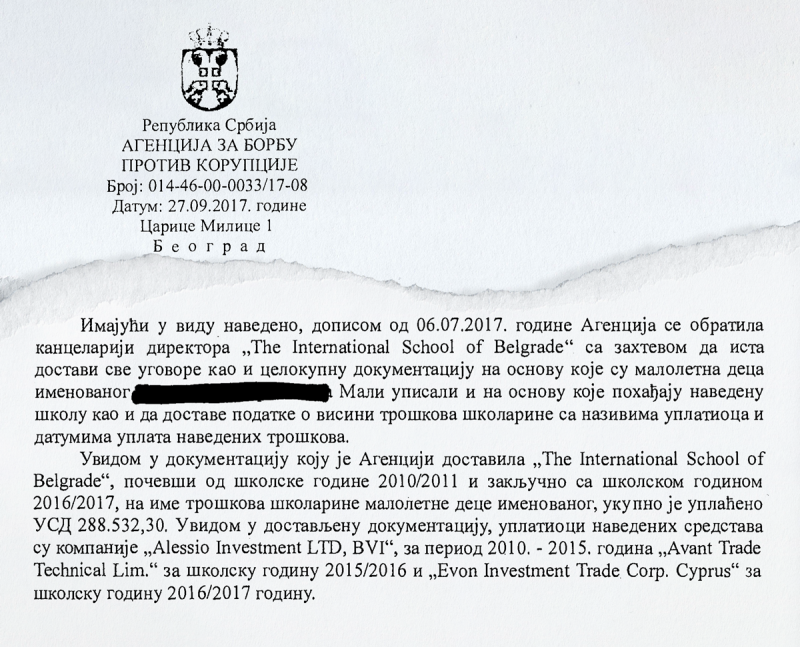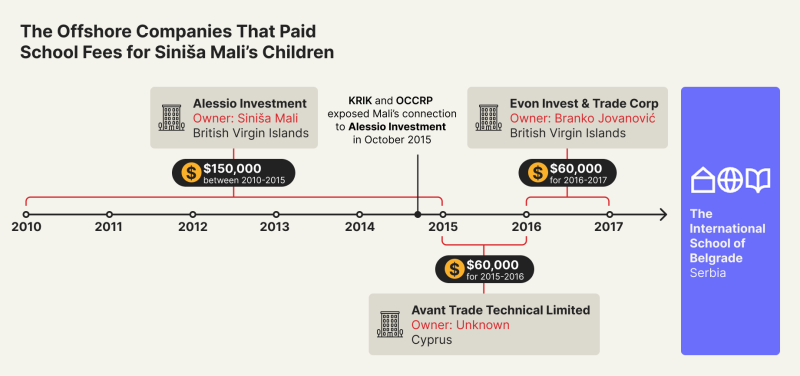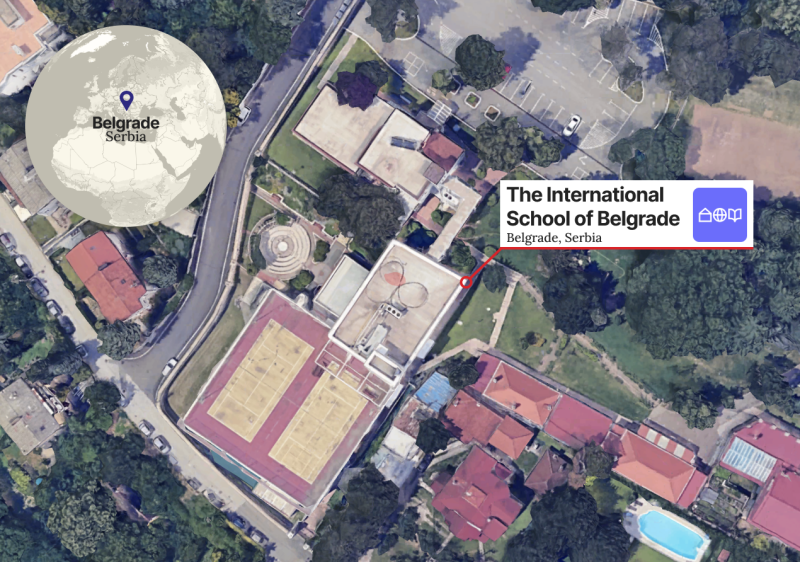Reported by
Standing alongside villas and embassies in a leafy district of the Serbian capital, the International School of Belgrade caters to the city’s elite. Annual tuition fees cost more than the salary of the city’s mayor.
But that did not stop Belgrade's former mayor Siniša Mali — now Serbia’s finance minister and a close ally of President Aleksandar Vučić — from sending three of his children to the private day school, spending around $60,000 in tuition and fees annually at a time when he was making the equivalent of $1,000 per month.
In 2016, while still mayor, Mali told a court that he had been able to provide his children with the pricey education thanks to the generosity of foreign friends — although he declined to name them.
The private school expenses were “paid by my friends... friends I have met abroad and who have no ties to Serbia,” Mali told a judge, who was adjudicating a dispute between him and his ex-wife.
The comment caught the eye of Serbia's anti-corruption agency, which opened a case and filed a report with prosecutors. The findings, however, never saw the light of day. Mali struck a deal with the prosecution, avoiding criminal charges and up to five years in prison by making a donation of $2,000 to charity. The case was shelved and forgotten.
But OCCRP and its Serbian partner KRIK can now reveal new details about how the Mali children’s school fees were paid.
The money arrived at the International School of Belgrade through three offshore companies — and their owners did, in some cases, have ties to Serbia, according to a confidential anti-corruption agency report KRIK obtained along with other documents and data.
A confidential report from Serbia's anti-corruption agency obtained by KRIK, naming the three offshore companies that paid the school fees.
The bulk of the money arrived from a British Virgin Islands company that Mali owned himself. It is unclear how that company was funded, and Mali did not respond to requests for comment.
In 2015, KRIK and OCCRP revealed that Mali played a role in that company. The following year, it stopped paying the Mali children’s school fees — but two other companies filled the gap. While reporters could not determine whether these companies had direct ties to Mali, both arrangements appear designed to conceal the source of the money used to pay the private school.
One of the companies, which is also registered in the British Virgin Islands, belonged to a Serbian businessman who told reporters his firm was used as an intermediary, keeping the true payer anonymous. He said he did not know where the money used for the school fees came from, since it was paid in cash to his financial services agent in Cyprus. (The agent denied any knowledge of the transaction). Even less is known about the third company, which is registered in Cyprus and whose ultimate owner is not publicly available.
Three different offshore companies paid the Mali children's school fees from 2010 to 2017.
Dušan Spasojević, a Serbian political analyst and political science professor, said the findings were significant because Mali is one of the most important politicians in the ruling SNS party, and the payments to the school appear to have been designed to obscure their origin.
"This shows us how much money politicians have and the extent to which they try to hide it,” Spasojević said.
“It might be acceptable for a father to pay for his daughter's or anyone else's education, but of course we as the public are interested in where the money comes from, because it is certainly not part of what was reported to the [anti-corruption] agency and what can be reasonably concluded based on the salary of someone who has been in the government of the Republic of Serbia for, I don't know how many, 10 years or 7-8 years,” he said.
This is not the first time Mali has come under scrutiny for a lifestyle that appeared out of step with his official income. OCCRP and KRIK previously revealed that he was the owner of two dozen apartments on Bulgaria’s coast, and that he deposited hundreds of thousands of dollars into bank accounts he and his family controlled. Even short holidays have greatly exceeded his income — a weekend trip he took to Rome in 2018 cost at least $8,500, which was nearly eight times his monthly salary as mayor at the time.
State institutions have launched two separate probes into Mali’s suspicious wealth, but in one case he cut a deal to avoid prosecution, while in another, a prosecutor declined to press charges. As Finance Minister, a role he has held since 2018, Mali now controls the Administration for the Prevention of Money Laundering, one of the bodies that had previously scrutinized him.
[W]e as the public are interested in where the money comes from, because it is certainly not part of what was reported to the [anti-corruption] agency and what can be reasonably concluded based on the salary of someone who has been in the government of the Republic of Serbia.
Dušan Spasojević, Serbian political scientist
Cash From the Caribbean
Most of the school expenses — some $150,000 between 2010 and 2015 — were paid for by Alessio Investment Ltd, a company registered in the notoriously opaque jurisdiction of the British Virgin Islands.
Although the owners of companies there are not made public, OCCRP and KRIK in 2015 obtained a power-of-attorney document that revealed Mali had served as Alessio Investment’s director. Separately, it emerged in testimony related to a court case involving the Mali family that Mali was also the owner of Alessio Investment.
Alessio Investment and the Mali Family
After KRIK and OCCRP revealed Mali’s role in Alessio Investment in 2015, the company stopped covering the tuition fees, according to Serbia’s anti-corruption agency, which obtained the names of the payees from the school.
In the following years, two other offshore companies would step in.
The International School of Belgrade from above.
'I Wish I Had Friends Like That'
Some $60,000 in tuition for the 2016-2017 school year arrived at the International School via another British Virgin Islands firm, Evon Invest & Trade Corp. Leaked company records from the Pandora Papers reveal its director to be a Serbian businessman named Branko Jovanović.
Approached by reporters, he confirmed that he was also the owner of the firm and explained how his company had ended up paying Mali’s school fees.
“I was told it's for a school, for children's education. Considering it's not weapons, drugs, and so on, I said, sure, pay it and take one percent, that's fine.”
Jovanović said this was not uncommon in the world of offshore finance.
"It's always been like that. Someone calls and asks if you can pay something, and if there are funds in the account, someone pays, and it's fine. You charge one percent for the service, and that's it."
The businessman said he didn't see anything suspicious about the transaction at the time, and that he wasn’t told that the school fees were for the Belgrade mayor’s children.
After he was told that cash had been delivered to the office of his financial agent in Cyprus, Jovanović gave the green light for the payment to be made from the Cypriot bank account of Evon Invest & Trade Corp., he said.
Informed that Mali had claimed his children's tuition was paid by friends, Jovanović said: "I wish I had friends like that... What kind of friends are those who will pay out of their own pocket for your children's education, and you never pay them back?"
Jovanovic told reporters that the person who arranged the transaction was Dejan Janjić, a Cyprus-based company formation agent who has worked with wealthy Serbians.
When contacted by reporters, Janjić said he did not remember Jovanović and that he had not been involved in the school fee transaction.
"Neither the name nor the company means anything to me. I honestly don’t know who you’re talking about, believe me, and I don’t know who this person is or what company it is,” he said.
Yet leaked emails from the Pandora Papers provide an indication that Jovanović did indeed work with Janjić; in 2015, the British Virgin Islands agency that registered his Evon Invest & Trade Corp. sent the company’s records to Janjić’s Cypriot firm.
Another School Year, Another Offshore Company
The previous year, yet another company had paid the Mali children’s school fees. This one, Avant Trade Technical Limited, was registered in Cyprus and hid its ownership through nominees. Its only listed shareholder is a service company that owns numerous Cypriot firms.
Although Cyprus does not currently require companies to publicly declare their ultimate beneficial owners (UBOs) — in other words, the person who ultimately profits from a company — it did for several months in 2022. OCCRP and KRIK reporters requested information on the company’s beneficial owner during that time, but were told the UBO had never been declared to the Cyprus registry.
Avant Trade Technical Limited does not have a website or appear to advertise its services publicly, and reporters did not receive answers to questions sent to its shareholders, secretary, or headquarters. According to Cypriot registry documents, its activities include “trading in telecommunication equipment” and “the provision of consultancy services and financing.”
The only trace of business activity reporters could find for Avant Trade Technical were several transactions involving Comita, a group of international companies headquartered in Moscow that operate across Europe — including in Serbia — and have a long history of working in the Russian telecom and energy sectors:
Comita’s Slovenian arm, which also runs its Serbian operations, paid Avant Trade Technical Limited 5 million euros ($6.5 million) in 2012, according to a database maintained by Slovenia’s anti-money laundering unit, which publishes high-risk transactions to and from entities outside Slovenia. The database does not provide details on the reason for the transaction, describing it only as: “ADVANCE PAYMENT UNDER THE CONTRACT.”
Comita in Slovenia then made two other payments of more than half a million dollars to Avant Trade Technical Limited in 2015, according to the database.
In 2015, Avant Trade Technical Limited took a 1.6-million-euro ($1.76 million) loan from a Cypriot firm that owned the Comita group company Iskra Systems, according to Avant Trade’s annual financial report.
Avant Trade Technical Limited also took over a Cyprus company in 2014 that had previously owned a Russian firm in the Comita group.
In Serbia, Comita operates through the same Slovenian arm that made payments to Avant Trade Technical Ltd. It opened a branch in Belgrade over a decade ago with the help of lawyer Igor Isailovic, a close friend and confidant of Mali.
But Isailovic is not Comita’s only connection to Mali. Comita has done business with KBV Datacom — a Serbian telecommunications company that KRIK has previously exposed as having an eye-catching connection to Mali’s family.
In 2019, reporters discovered that Mali’s brother Predrag had for five years been driving an Audi A6 that belonged to KBV Datacom and its sister company Millennium Team, one of Serbia’s biggest construction companies. (The Mali brothers have never publicly commented on the finding.)
Both companies have been awarded a number of high-profile contracts from the Serbian state, KRIK has reported, including the controversial urban development project Belgrade Waterfront, which Millennium Team worked on and Mali was in charge of negotiating.
Data from Slovenia’s anti-money-laundering unit shows that Comita made a payment through its Serbian branch of more than $1 million to Millennium's sister company KBV Datacom in August 2019.
When reached for comment, a lawyer representing Millennium Team and KBV Datacom said the two companies “had nothing to do with financing the school fees” of Mali’s children. The lawyer did not respond to questions about whether the firms had any business relationship with Avant Trade Technical Limited, or the purpose of the payment KBV Datacom received from Comita.
Comita did not respond to requests to comment.
Anuška Delić (OCCRP/Oštro) and Andreas Cosma (OCCRP/CIReN) contributed reporting






